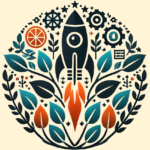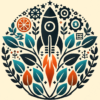Beginning with Intention: Reflections from the first Europe–Africa–Asia session
We opened the first session of the new EcoLaunch sprint with a small but thoughtful group spread across multiple time zones. Some were returning after a break, others were joining for the first time. For all, it marked a recommitment to their path as practitioners and professionals building Nature-based enterprises, advancing NatureTech innovation, or evolving their own capacity to contribute.
Each EcoLaunch sprint spans nine weeks. The arc begins with intention-setting, deepens through weekly interactive masterclasses with global experts, and concludes with a reflective retrospective. These intentional structures are designed to help participants hold focus across both the inner and outer dimensions of regenerative work.
The session created space for open reflection on what matters most—personally and professionally. Participants named what they hoped to strengthen in themselves and in their work, and began to shape clear intentions to carry forward across the next nine weeks.
The structure invited each person to reflect in solitude, then share selectively within the group. First, we explored the inner work. Using the Inner Development Goals framework as a foundation, we invited participants to reflect on their current relationship to themselves—where they feel stretched, stuck, or in need of renewal. Questions included:
What inner capacities do I want to strengthen—clarity, courage, compassion, presence?
What patterns or habits might be limiting how I show up?
When do I feel most aligned with my purpose—and what conditions allow that?
From these reflections, a wide range of insights emerged. One participant noted how they take on too many projects at once, not because of time pressure alone, but because they underestimate the mental space those commitments require. Another spoke of their sense of connection in native ecosystems and the emotional impact of being immersed in old, intact landscapes. Others reflected on patterns of distraction or scattered attention, and how their wellbeing and self-care practices correlate with their capacity to contribute.
One shared how he finds himself most fulfilled when his work aligns with his expertise—when he draws on the full depth of knowledge and experience he’s cultivated over years. Another reflected on the role of assumptions, recalling how as a recent migrant, he expected he wouldn’t be able to work in his field. That assumption dissolved when he secured a university post shortly after arriving.
In one exchange, a participant described his desire to serve as a bridge between research and policy. He spoke of translating environmental knowledge across cultures, learning from different approaches, and engaging with stakeholders to embed Nature-based solutions into planning and governance. Others resonated with the theme of finding flow through connection—with Nature, with peers, and with a purpose that draws from within rather than being imposed from outside.
The intention of this session was to create a space for honest, open inquiry into what matters most right now. Participants were encouraged to articulate goals that reflect both the momentum of their initiatives and the development of the person leading them.
We ended with a round of highlights and takeaways. Many spoke of how affirming it was to hear each other’s reflections. Several expressed relief at being invited to look inward as a first step, rather than launching straight into performance metrics. The space felt grounded, calm, and purposeful.
This session was a container for clarity—where people doing serious work in biodiversity conservation, ecological restoration, and regenerative development can pause and realign with what brought them here in the first place.
If you’re working towards a regenerative future, consider taking a few moments to ask yourself:
What do I need to remember, release, or recommit to?
What kind of leader or practitioner do I want to be—at this stage of my life?
What’s one inner capacity I want to cultivate over the coming months?
This is the kind of grounding clarity we create together at EcoLaunch. If you’d value a process like this, learn more about EcoLaunch.


 Cohorts meet weekly across two time zones: Tuesdays 7pm CEST (Americas–Europe–Africa) and Thursdays 10am CEST (Europe–Africa–Asia–Australasia). Scholarships available.
Cohorts meet weekly across two time zones: Tuesdays 7pm CEST (Americas–Europe–Africa) and Thursdays 10am CEST (Europe–Africa–Asia–Australasia). Scholarships available.
 Alvaro Vallejo Rendón unpacked the key distinctions between carbon and biodiversity credits, highlighting why understanding these differences is critical for entrepreneurs navigating environmental markets. He also shared actionable strategies for effective monitoring and verification practices in biodiversity credit markets.
Alvaro Vallejo Rendón unpacked the key distinctions between carbon and biodiversity credits, highlighting why understanding these differences is critical for entrepreneurs navigating environmental markets. He also shared actionable strategies for effective monitoring and verification practices in biodiversity credit markets. Key Takeaway: Whether discussing biodiversity credits, impact investment, circular economy, or regenerative practices, a common theme emerged—entrepreneurs have a unique opportunity to align innovation with meaningful environmental and social impact.
Key Takeaway: Whether discussing biodiversity credits, impact investment, circular economy, or regenerative practices, a common theme emerged—entrepreneurs have a unique opportunity to align innovation with meaningful environmental and social impact.